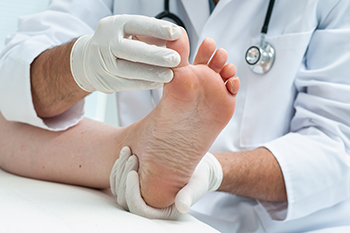
Moccasin-type athlete’s foot is a fungal infection that affects the soles of the feet, often causing dry, itchy, and thickened skin. Unlike the classic form of athlete’s foot, which typically appears between the toes, or a type that causes blisters on the sole of the foot, moccasin-type covers the bottom and sides of the foot, resembling the fit of a moccasin. This type can cause scaling, cracking, and even a rough texture that may extend to the heels. Moccasin-type athlete’s foot is stubborn and can be difficult to treat, as the fungus may penetrate deeper skin layers. People with sweaty feet, compromised immune systems, or a history of foot infections are at higher risk. Treatment often involves topical antifungal creams or, in persistent cases, oral antifungals. To prevent recurrence, keeping feet clean, dry, and wearing breathable shoes is essential. If you have developed what seems to be a fungal infection on your feet, it is suggested that you promptly schedule an appointment with a podiatrist for care.
Athlete’s Foot
Athlete’s foot is often an uncomfortable condition to experience. Thankfully, podiatrists specialize in treating athlete’s foot and offer the best treatment options. If you have any questions about athlete’s foot, consult with Paul Hutchison, DPM from Hutchison Foot Clinic. Our doctor will assess your condition and provide you with quality treatment.
What Is Athlete’s Foot?
Tinea pedis, more commonly known as athlete’s foot, is a non-serious and common fungal infection of the foot. Athlete’s foot is contagious and can be contracted by touching someone who has it or infected surfaces. The most common places contaminated by it are public showers, locker rooms, and swimming pools. Once contracted, it grows on feet that are left inside moist, dark, and warm shoes and socks.
Prevention
The most effective ways to prevent athlete’s foot include:
- Thoroughly washing and drying feet
- Avoid going barefoot in locker rooms and public showers
- Using shower shoes in public showers
- Wearing socks that allow the feet to breathe
- Changing socks and shoes frequently if you sweat a lot
Symptoms
Athlete’s foot initially occurs as a rash between the toes. However, if left undiagnosed, it can spread to the sides and bottom of the feet, toenails, and if touched by hand, the hands themselves. Symptoms include:
- Redness
- Burning
- Itching
- Scaly and peeling skin
Diagnosis and Treatment
Diagnosis is quick and easy. Skin samples will be taken and either viewed under a microscope or sent to a lab for testing. Sometimes, a podiatrist can diagnose it based on simply looking at it. Once confirmed, treatment options include oral and topical antifungal medications.
If you have any questions, please feel free to contact our office located in Memphis, TN . We offer the newest diagnostic and treatment technologies for all your foot care needs.
